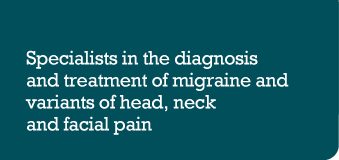| |
What options do I have to manage my migraines?
Each patient needs two basic strategies in management of Migraine and other headache disorders.
- Immediate action: Treatment individually optimised to subdue your acute attack when it happens, to reduce the impact on your daily activities.
- Prevention: strategy or treatment to diminish the frequency, severity and duration of your attacks overall.
For immediate action, there are specific painkillers, together with muscle relaxants and anti-nausea medications, that may be tailored to controlling the acute attack in an individual.
For overall prevention, there are also medical options, with muscle relaxants and a number of licensed medications found to be useful in migraine and neuropathic pain. Virtually every agent known to affect nerve pathways has been tried in migraine, and some drugs have been found to be useful, as they stabilise nerve pathways or connections in migraine – though their original design was for other purposes, e.g. in epilepsy, mood control or even heart rate control.
Some general medications can provoke headache, and (painkiller) Medication Overuse Headache is an increasingly recognised problem. At the Norfolk Migraine Clinic, we re-evaluate the impact of any medications you may already be taking as part of your initial assessment.
Medical interventions
- Botox
Recent research has highlighted potential benefits from Botox treatment in a specially-selected group of patients with chronic migraine. The way in which this benefit occurs is also still under debate, but the function of Botox in its other applications has largely been directed at counteracting muscle spasm (although it also has established benefits in managing autonomic nerve problems).
- Greater Occipital Nerve Block
This has been quite widely practised for a number of years, and currently finds favour in the management of Cluster Headache in leading headache centres. The way in which GON Blocking helps is not proven; and unfortunately its effects have not been shown to be sustained in a number of studies. However, it is inevitable in applying this technique that a key muscle attachment involved in the potential areas of problem in the neck is being treated: a muscle attachment that benefits the mechanisms affecting the trigeminal nuclei.
- Muscle dynamics options: a special interest of this clinic
At the Norfolk Migraine Clinic, an extended systematic treatment of relevant neck muscles has been found to promote much longer-term benefits as malfunctioning muscles are rehabilitated as a set, strengthening and correcting them in order to relieve the background stress which provokes the nuclei which generate migraine.
For your personal treatment plan, please book an appointment on 01603 81 22 66.
|

